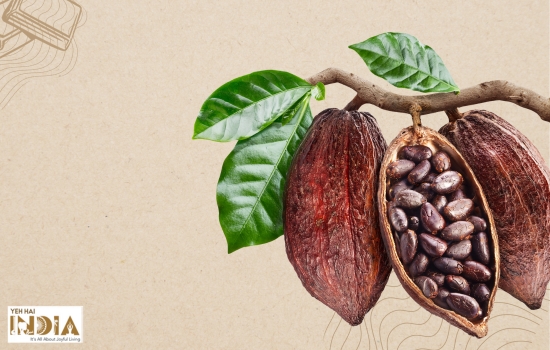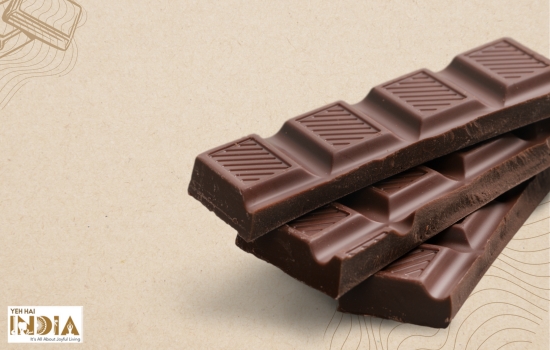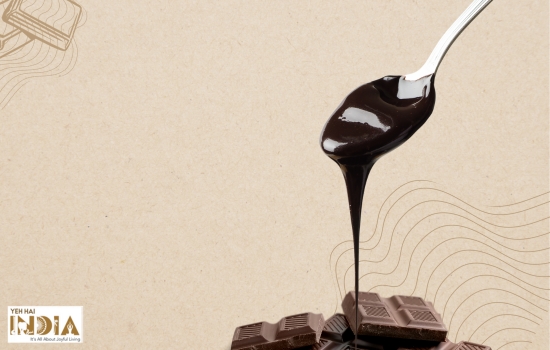Chocolate lovers frequently find their way into celebrations and moments of self-indulgence. Beyond its wonderful taste and cultural significance, there is rising interest in discovering whether dark chocolate might provide more than simply a satisfying bite. In this article, we will investigate the intriguing question: Can dark chocolate, with its varied flavours and cocoa richness, be an unexpected ally in the battle for weight loss?
Dark chocolate is chocolate produced from cocoa solids, cocoa butter, and sugar. It is often darker in colour and has a more bitter flavour than milk chocolate. Dark chocolate is a famous dessert that is appreciated for its distinct flavour and health advantages.
In recent years, there has been a surge of interest in dark chocolate’s possible weight loss advantages. According to some research, dark chocolate may aid in weight loss by suppressing hunger, improving metabolism, and decreasing inflammation.
Nutrients in Dark Chocolate
Before looking into dark chocolate’s potential weight reduction effects, it’s critical to understand its nutritional content.

In contrast to its sweeter competitors like milk chocolate and white chocolate, dark chocolate contains several vital nutrients that can provide both pleasure and potential health advantages.
Calorie Content
Dark chocolate has a high-calorie content. A 100-gram bar of 70–85% cocoa dark chocolate contains around 600 calories. When introducing dark chocolate into your diet, it’s crucial to keep portion sizes in mind.
Macronutrient Composition in Dark Chocolate
Fat: The majority of the fat in dark chocolate comes from cocoa butter. It’s high in both healthy monounsaturated and saturated fats. These fats contribute to the creamy consistency and pleasurable mouthfeel of chocolate.
Carbohydrates: Dark chocolate includes carbs, largely in the form of sugar and dietary fibre. The sugar amount varies based on the kind and amount of cocoa used. High-quality dark chocolate contains less added sugar.
Protein: While not a significant source of protein, dark chocolate does contain trace levels. A 100-gram bar may contain 8–10 g of protein.
Fibre: Dark chocolate includes nutritional fibre, which contributes to its overall calorie count. Fibre is important for digestive health and might help you feel full.
Role of Cocoa

The nutritive value of dark chocolate is directly related to its cocoa content. Flavonoids, a class of bioactive chemicals with possible health advantages, are abundant in cocoa.
Flavonoids are antioxidants that may help with weight loss by altering aspects such as appetite control, metabolism, and inflammation. Dark chocolate has more cocoa than milk or white chocolate, making it a more powerful source of these possible advantages.
For enhanced flavonoid content and fewer added sugars, consider dark chocolate with a higher cocoa content (70% or above).
While the calorie count in dark chocolate appears to be high, it is the calibre of those calories, particularly the flavonoids, that makes it an interesting issue in the context of weight reduction.
However, moderation is still essential, since excessive intake might result in excessive calories and weight gain.
Dark Chocolate and Weight Loss

There are several conceivable processes through which dark chocolate might aid in weight reduction. However, it is critical to approach this theory with a balanced viewpoint and to assess the existing scientific data.
Appetite Control
Flavonoids in dark chocolate have been linked to better appetite management, they may help reduce cravings and create a sensation of fullness, which further results in lower calorie consumption, which is extremely important for weight management.
Increased Metabolism
The antioxidants in cocoa may have a beneficial effect on metabolic processes. They have the potential to boost the utilisation of glucose and lipids, actually leading to increased energy expenditure.
Increased metabolic rate, eating one of your favourites like dark chocolate can help you burn more calories throughout the day, and is dreamy and magical.
Blood Sugar Management
Dark chocolate, particularly when high in cocoa content, may have a beneficial effect on blood sugar levels. Improved blood sugar regulation can help reduce energy spikes and crashes, lowering the risk of over-eating due to unexpected hunger.
Portion Control in Dark Chocolate Consumption

Eating dark chocolate may aid weight loss, but it must not be overlooked that moderation is the key to a successful weight loss plan.
For an unintentional jeopardising of the weight reduction objective, portion control is critical to receiving the potential benefits.
Why is portion control important?
1. Overindulgence
Overindulging can result in an overabundance of the following nutrients, which, if not accounted for, can contribute to weight gain.
2. Calorie Consciousness
Despite its possible benefits, dark chocolate is high in calories. Excessive consumption can rapidly lead to a calorie surplus, which can stymie weight loss attempts.
An ounce of dark chocolate has around 150–170 calories.
3. Sugar and Fat Content
Even dark chocolate with a substantial cocoa content contains sugar and cocoa butter, which contribute to sugar and fat consumption.
4. Caffeine Sensitivity
Caffeine sensitivity manifests as an elevated heart rate and restlessness. Therefore, eating large amounts of dark chocolate in the evening might alter sleep patterns, which could potentially influence weight control.
Portion Control Guidelines
- Mindful Consumption
- Read labels and keep serving sizes in mind.
- If you’re unsure about portion quantities, use a kitchen scale.
- Determine your daily limits based on your total calorie and nutritional goals.
- Pair with nutritious and healthy alternatives like fresh fruit, almonds, or yoghurt.
Dangers of Overindulgence in Dark Chocolate

Overindulging in dark chocolate might nullify its potential weight-loss advantages. Excessive intake can result in the following:
- Calorie Surplus
- Blood sugar spikes
- Caffeine disturbances lead to disturbed sleep patterns and metabolism
Dark Chocolate vs. Other Snacks
| Characteristics | Dark Chocolate | Potato Chips | Chocolate Pastry | Chocolate Candy |
|---|---|---|---|---|
| Cocoa solids | High (>70%) | Low (<10%) | Low (<10%) | Low (<10%) |
| Sugar | Moderate | High | High | High |
| Fat | High (mostly healthy fats) | High (mostly unhealthy fats) | High (mostly unhealthy fats) | High (mostly unhealthy fats) |
| Fibre | Moderate | Low | Low | Low |
| Calories | Moderate (150-200 per ounce) | High (150-200 per ounce) | High (200-300 per ounce) | High (200-300 per ounce) |
| Micronutrients | High in – Antioxidants – Vitamins – Minerals | Low in micronutrients | Low in micronutrients | Low in micronutrients |
| Benefits | May reduce the risk of heart disease Improve blood flow Reduce inflammation Protect against cognitive decline | Provides energy | Provides energy Might improve the mood | Provides energy Might improve the mood |
Important Takeaway
Dark chocolate, a popular snack option, has a balanced nutritional profile with higher cocoa content and lower sugar levels, providing essential minerals and antioxidants. Its rich flavour and structure may promote satiety, making it an appealing option for weight loss.
However, moderation is key, as consuming one or two squares daily allows for enjoyment without jeopardising overall dietary objectives. Dark chocolate’s potential role in weight loss is intriguing due to its antioxidant-rich cocoa content. While there are mechanisms suggesting dark chocolate could aid in appetite regulation and metabolism, scientific evidence remains limited.
Consuming small portions of high-quality dark chocolate as an occasional treat within a balanced diet might provide some benefits without undermining weight loss goals.
However, relying solely on dark chocolate as a weight loss strategy is not recommended, and consulting with a healthcare professional or registered dietitian is advisable for personalised guidance.
The goal is to strike a balance between indulgence and responsibility when incorporating dark chocolate into your weight management plan.
Recommended Article: Are Digestive Biscuits Healthy?
Sources:
- Almiron-Roig, E., & Flores-Bellver, M. 2017. The effect of cocoa on weight loss: A systematic review and meta-analysis of randomized controlled trials. Critical Reviews in Food Science and Nutrition, 57(13), 2762-2771.
- Almoosawi, S., Ibrahim, M. F., & Mohammed, A. A. 2019. Consumption of dark chocolate is associated with lower body weight and waist circumference in adults: A systematic review with meta-analysis. Journal of the Academy of Nutrition and Dietetics, 119(7), 1184-1198.










